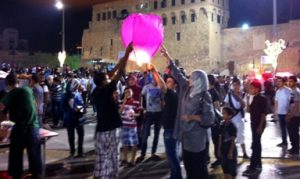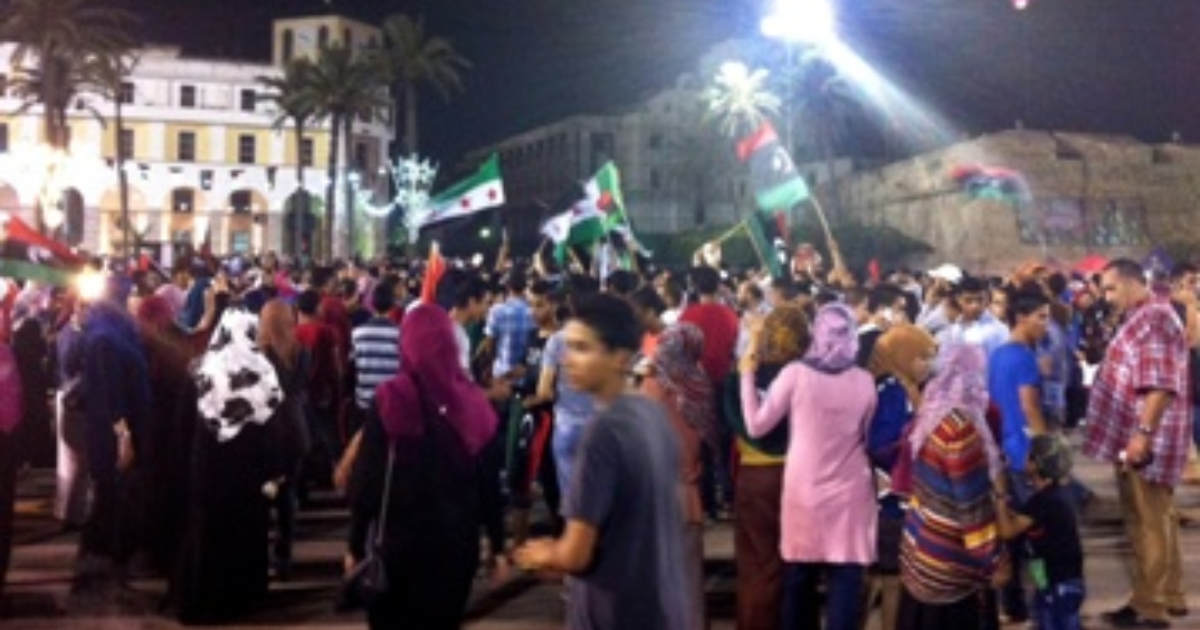It is Ramadan in Libya and Tripoli is a city transformed. The traffic and noise that usually fill the daylight hours is gone, and the myriad of pavement cafes that have sprung up since the revolution have closed their shutters and suspended their brisk trade in sweet cappuccinos. Only after dark does the city again come alive.
It was during the long nights of Ramadan last year that Tripoli sensed the possibility of succeeding in their efforts to drive Gaddafi from his capital and from the sprawling concrete fortifications that dominate large parts of the city. Many were hoping success would come in time for Eid. In the end success came even sooner, as on the 20th day of Ramadan a convoy of revolutionaries rolled almost unopposed down the coastal highway and into what has since been known as Martyrs’ Square in the very heart of Tripoli.
On the 20th day of Ramadan this year Tripoli celebrated the anniversary of what most now regard as their liberation. Martyrs’ Square was again at the heart of the festivities. I walked through the square with Mohammed and Mahmoud as celebrations were getting underway following the breaking of the fast and evening prayers. The reality of post revolution Libya looks increasingly complicated, and much of this complexity was on display on the square that night.
In many respects, life in Libya is clearly improving. “Let us not carry weapons during Ramadan” implores an advertisement that is currently running on local radio, and the message appears to be getting through. There are far fewer weapons in public than there were just a few months ago. There are also far fewer checkpoints on major roads and, as celebrations unfolded, Martyrs’ Square was filled by families fuelled by candyfloss and popcorn rather than by weathered fighters. Public awareness campaigns urging an end to celebratory gunfire also appear to have met with a measure of success as fireworks now supply most of the noise and entertainment.
At the same time, there is growing concern about more organised criminality and violence. A sustained and violent campaign against the Red Cross recently forced them to suspend vital humanitarian operations in both Benghazi and Misurata, and an organised campaign targeting former members of Gaddafi’s armed forces has left a number dead in Benghazi. Stories of organised gangs of carjackers targeting specific models are also circulating in Tripoli, and on the eve of Eid two deadly explosions struck military targets in the heart of the city. The rule of law has clearly yet to re-established in Libya, and as other transitional societies have shown—most notably the Balkans—it is in such environments that organised criminality can flourish.
As we walked through Martyrs’ Square that night—weaving our way past large banners, trampolines for the children, and vendors of an endless variety of souvenirs in the colours of Libya’s new flag—the mood was undoubtedly optimistic. A children’s’ choir performed the Libyan national anthem Gaddafi had once banned, and revolutionary icons shared their war-stories with crowd that had likely heard them all before, but were eager to relive them once more. In one corner of the square a campaign of solidarity promised Syrians a share in their newfound freedom and encouraged them to persevere.

As he partook in celebrations, however, Mahmoud wore a t-shirt with a picture of his cousin. His cousin was one of the many young men killed during the revolution, and one of the many young men being remembered at a candlelight vigil for reconciliation held near to the square. Mahmoud’s t-shirt is a reminder that the success of Libya’s revolution did not come cheap. Thousands were killed, a great deal of damage was done to its major cities, and many communities remain deeply divided. Those who fought for Gaddafi are, of course, struggling to find their place in a new Libya. There are also stories, however, of families that simply fled the fighting finding they are no longer welcome in the communities they are perceived by some to have abandoned.
Systematic efforts to engage with the crimes perpetrated under Gaddafi’s rule, as well as during the revolution itself, have been slow to develop. The judicial system faces an overwhelming caseload, and few efforts have been made to systematise and prioritise this work. Efforts are hampered further by the fact that the government does not yet have custody of all of the accused, with many are still held by the revolutionary brigades that arrested them many months ago. Most importantly, however, little had been done to engage the general public in a meaningful discussion of what Libya’s transitional justice priorities should be, and little has been done to explore the possibility of other mechanisms complementing and supporting the work of the overstretched judiciary.
Libyan civil society remains energised and vibrant, but many are increasingly impatient to see clear progress following the success of their revolution. The 20th night of Ramadan was therefore also being celebrated for another reason. Just south of Martyrs’ Square, at the same hotel where just over a year earlier Saif al-Islam Gaddafi made one of his last defiant public appearances as a free man, and where in March 2011 the courageous Iman al-Obeidi burst in to tell the international press corps of her own brutal rape by Gaddafi troops, Libya was witnessing the first peaceful transfer of power in its modern history. The National Transitional Council (NTC), the body that has steered Libya since the revolution, dissolved itself and handed power to a newly elected national council. The peaceful transfer of power was worthy of its own celebrations, but many were undoubtedly also celebrating the end of a transitional body with which they had grown frustrated. The main task of the new national assembly is to appoint a 60-person committee that will oversee the drafting of a new constitution, before it too makes way for new elections.
There is a great deal of interest and enthusiasm for Libya’s new elected government, but also a clear desire to ensure it is closely monitored and held accountable for its work. Televised sessions are widely watched and discussed, and some are already questioning whether the drafting of the constitution will be the collaborative effort they had hoped for. The continued absence of a professional and independent media will mean much of this responsibility will fall to civil society.
It is only a year since the revolutionaries rolled in to Martyrs’ Square, and much less than a year since the end of fighting in other parts of the country. Libya is going through a difficult period of transition, but there are a number of positive signs to justify some optimism. The relative success of the elections and transfer of power has inspired many Libyans, and if momentum can be sustained in a way that engages and sustains the interest of those celebrating in Martyrs’ Square that night, Libya will have many resources to draw on as it rebuild itself and confronts the many challenges it has yet to brave.
* Michael Gibb is NPWJ Libya Project Coordinator and currently based in Libya.




